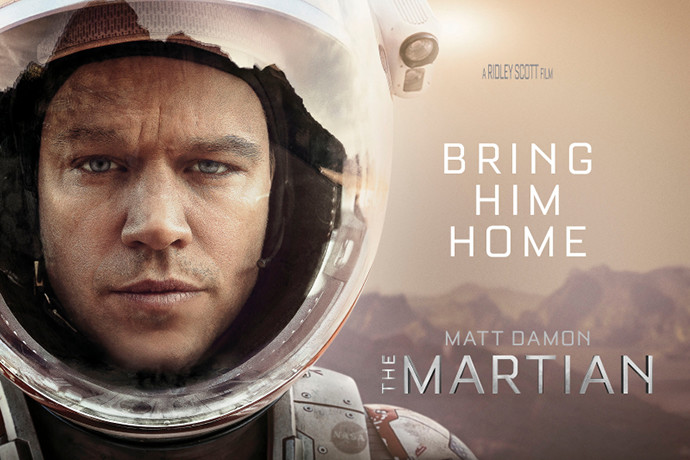Left Cold on Mars
Learning about story structure has become a double-edged sword. It gives me the knowledge to properly frame my story, a checklist to help tame the wild and capricious nature of the Muse. As a creator, this information is invaluable for turning the fleeting images in my head into a coherent and impacting tale. It provides me with the tools through which I am turning this hobby into a professional endeavor. As a consumer, however, it is killing my enjoyment of the medium I hold most dear: storytelling.
Lately, I can’t seem to read a book, watch a television show, or even see a movie without breaking down the different components of a typical three-act structure. I have upped my criticism game by knowing exactly how a story fails, whether it be from a lack of an internal character arc to allow the audience to become more engaged, improper rising action that doesn’t let the stakes naturally escalate, or inaccurate placement of plot points that results in the story dragging or having a dissatisfying resolution. I have even begun predicting plots and twists with alarming accuracy, based on the principles behind telling a good story. In short, I have lost the ability—at least temporarily—to sit back and be fully immersed in the fictional world before me.
This realization came about from a movie outing recently, to see The Martian, starring Matt Damon. Full disclosure: I haven’t read the book and knew very little going in other then what a quick Rotten Tomatoes-search revealed. Cast Away meets Apollo 13, on Mars. I adore Cast Away, science fiction, and all things space, so I was excited to see what this movie would bring to the table. Mostly, though, I was curious to discover how, exactly, one would survive alone on a barren planet.
Slight spoilers ahead: it was a good thing that the science of “how” was my main curiosity, because that was all the movie had going for it. This was no Cast Away. There was no real connection to the trials and isolation of the main character, Mark Watney, nor to the emotional plight of the crew who left him behind. The movie tried valiantly to show the audience the camaraderie and closeness they all shared through the crew’s reaction to the event, through their tears and speeches, but by then, it was too late. The Martian fails on a resonant, character-driven front with its opening scene: the dust storm that forces the crew to leave and Watney to be presumed dead.
This relates to the discussion of demystifying story structure because this scene should NOT have been the opener. No matter what story structure you go with (Hero’s Journey, Three-Act, Four-Act, Five-Act Structures), they all basically are talking about the same thing with different terminology. Every single one of them requires set-up, showing the “little bit of normal” before the world changes, to introduce the audience to character, setting, theme, etc. There are two distinct terms that consistently appear in all structure discussions that come in the First Act: the Hook and the Inciting Incident. This movie regrettably thought they were one and the same.
A hook is a question, a point of interest, that opens your story to get the reader/watcher invested as you build up your characters and your world. An inciting incident is the turning point in the story, the global plot that the main character is suddenly thrust into (typically occurring halfway through the First Act, around the 12% mark, in the Three-Act Structure most often seen in Hollywood). In The Martian, that’s the dust storm. Watney gets left behind.
BEFORE that, however, we the audience needed to see his normal. We needed to experience his relationship with the rest of the crew for his loss and their guilt to be truly felt. Just being on Mars was the hook: seeing this space-station life, describing their mission, what resources they had, etc. All things that come up later as Watney is rifling through the crew’s left-behind belongings, but what’s missing is the interaction that would have come from introducing this all before disaster strikes. What the audience is left with is a movie of being told what the characters feel as opposed to showing it: we know the crew feels guilty because we see their tears, hear their reactions, but since we don’t get to experience how bonded these characters are during normal circumstances, we don’t have a true measure of the depth of their emotions during the extraordinary ones. It just doesn’t resonate—or didn’t with me, at least.
This is precisely the reason I keep bringing up Cast Away as a comparison, aside from the obvious similarities of surviving while stranded. Everything I just mentioned as a flaw for The Martian is done brilliantly in Cast Away, and that is why Cast Away will prove to be the more iconic and transcendent of the two. It has everything that The Martian does—interesting location, isolation, fight for survival amid increasingly difficult circumstances—but the emotional resonance is the true takeaway from the movie. We feel every bit of Chuck Noland’s struggle on the island, his fight to stay alive for the woman he loves. The regrets over the relationship he took for granted, gone unrealized until he loses it forever. It’s moving, poignant, and gives us insight into how we live our everyday lives. That’s great storytelling. The Martian is merely good.
I did look up the eponymous book for The Martian while writing this post, and it looks like the 2011 bestseller is written much in the same way as the screenplay for the movie. Perhaps it just not meant to be “more;” it’s certainly done well enough as-is. Author Andy Weir’s story on how he approached the idea and the subsequent success he’s found is nothing short of a fairy tale, and I give him all the credit in the world for bringing an idea to fruition in such a way that its captivated millions of people. I dream of having even a small fraction of that level of success. I want my stories, however, to dig deeper than this book appears to and resonate with readers in a way that changes them. That’s my fairy tale.
It’s difficult walking away from a largely well-executed movie or book with these feelings of, “It could have been better,” and know precisely what I would have changed to make it better—for me and my tastes, if nothing else. Not only am I a creator of stories, but I’m also an avid consumer of them. I would love to switch a button and be able to forget all that I’ve learned, just sit back and enjoy the ride that others have built, but it doesn’t work like that. I deconstruct, I critique, I ask questions. That’s how I’ve always functioned, and now there’s this whole new level of engaging with entertainment in a critical way that serves to further distance me from its intended enjoyment.
Demystifying things always seems to have this result, though. The magician’s act is never quite as magical once one knows the solution, but something we don’t often think about is that the magician himself always knows. He seeks out new tricks and grand solutions to enthrall others, but he gives up his own ability to be enthralled. He has decided that bringing wonder and magic to the world is more important than experiencing it for himself. He finds a different satisfaction than others do in his work: while the audience sits in rapture of his tricks, he finds joy in their reaction, their willingness to believe.
I understand where the magician is coming from. Whether or not my newfound heightened critical response is a temporary or permanent state of mind, it’s more than a fair trade-off for the ability to write my stories and the potential to touch people with their message. Just as the magician finds joy in bringing a little magic into his audience’s lives, so too will I thrive on bringing a little wonder to that of my readers.


